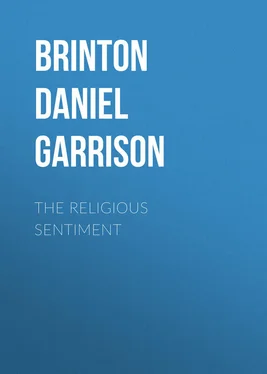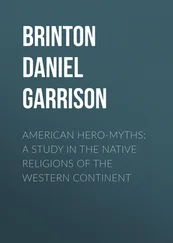Daniel Brinton - The Religious Sentiment
Здесь есть возможность читать онлайн «Daniel Brinton - The Religious Sentiment» — ознакомительный отрывок электронной книги совершенно бесплатно, а после прочтения отрывка купить полную версию. В некоторых случаях можно слушать аудио, скачать через торрент в формате fb2 и присутствует краткое содержание. ISBN: , Жанр: foreign_antique, foreign_prose, на английском языке. Описание произведения, (предисловие) а так же отзывы посетителей доступны на портале библиотеки ЛибКат.
- Название:The Religious Sentiment
- Автор:
- Жанр:
- Год:неизвестен
- ISBN:http://www.gutenberg.org/ebooks/30061
- Рейтинг книги:3 / 5. Голосов: 1
-
Избранное:Добавить в избранное
- Отзывы:
-
Ваша оценка:
- 60
- 1
- 2
- 3
- 4
- 5
The Religious Sentiment: краткое содержание, описание и аннотация
Предлагаем к чтению аннотацию, описание, краткое содержание или предисловие (зависит от того, что написал сам автор книги «The Religious Sentiment»). Если вы не нашли необходимую информацию о книге — напишите в комментариях, мы постараемся отыскать её.
The Religious Sentiment — читать онлайн ознакомительный отрывок
Ниже представлен текст книги, разбитый по страницам. Система сохранения места последней прочитанной страницы, позволяет с удобством читать онлайн бесплатно книгу «The Religious Sentiment», без необходимости каждый раз заново искать на чём Вы остановились. Поставьте закладку, и сможете в любой момент перейти на страницу, на которой закончили чтение.
Интервал:
Закладка:
This conclusion as to the nature of love has long been recognized by thinkers. Richard Baxter defined it as “the volition of the end,” “the motion of the soul that tendeth to the end,” and more minutely, “the will’s volition of good apprehended by the understanding.” 34 34 A Christian Directory. Part I. Chap. III.
In similar language Bishop Butler explains it as “the resting in an object as an end.” 35 35 “The very nature of affection, the idea itself, necessarily implies resting in its object as an end.” Fifteen Sermons by Joseph Butler, late Lord Bishop of Durham , Preface, and p. 147 (London, 1841).
Perhaps I can better these explanations by the phrase, Love is the mental impression of rational action whose end is in itself .
Now this satisfaction is found only in one class of efforts, namely, those whose result is continuity, persistence, in fine, preservation . This may be toward the individual, self-love, whose object is the continuance of personal existence; toward the other sex, where the hidden aim is the perpetuation of the race; toward one’s fellows, where the giving of pleasure and the prevention of pain mean the maintenance of life; toward one’s country, as patriotism; and finally toward the eternally true, which as alone the absolutely permanent and preservative, inspires a love adequate and exhaustive of its conception, casting out both hope and fear, the pangs of desire as well as the satiety of fruition.
In one or other of these forms love has at all times been the burden of religion: the glad tidings it has always borne have been “love on earth.” The Phœnix in Egyptian myth appeared yearly as newly risen, but was ever the same bird, and bore the egg from which its parent was to have birth. So religions have assumed the guise in turn of self-love, sex-love, love of country and love of humanity, cherishing in each the germ of that highest love which alone is the parent of its last and only perfect embodiment.
Favorite of these forms was sex-love. “We find,” observes a recent writer, “that all religions have engaged and concerned themselves with the sexual passion. From the times of phallic worship through Romish celibacy down to Mormonism, theology has linked itself with man’s reproductive instincts.” 36 36 Dr. J. Milner Fothergill, Journal of Mental Science , Oct. 1874, p. 198.
The remark is just, and is most conspicuously correct in strongly emotional temperaments. “The devotional feelings,” writes the Rev. Frederick Robertson in one of his essays, “are often singularly allied to the animal nature; they conduct the unconscious victim of feelings that appear divine into a state of life at which the world stands aghast.” Fanaticism is always united with either excessive lewdness or desperate asceticism. The physiological performance of the generative function is sure to be attacked by religious bigotry.
So prominent is this feature that attempts have been made to explain nearly all symbolism and mythology as types of the generative procedure and the reproductive faculty of organism. Not only the pyramids and sacred mountains, the obelisks of the Nile and the myths of light have received this interpretation, but even such general symbols as the spires of churches, the cross of Christendom and the crescent of Islam. 37 37 The most recent work on the topic is that of Messrs. Westropp and Wake, The Influence of the Phallic Idea on the Religions of Antiquity , London, 1874.
Without falling into the error of supposing that any one meaning or origin can be assigned such frequent symbols, we may acknowledge that love, in its philosophical sense, is closely akin to the mystery of every religion. That, on occasions, love of sex gained the mastery over all other forms, is not to be doubted; but that at all times this was so, is a narrow, erroneous view, not consistent with a knowledge of the history of psychical development.
Sex-love, as a sentiment, is a cultivated growth. All it is at first is a rude satisfaction of the erethism. The wild tribes of California had their pairing seasons when the sexes were in heat, “as regularly as the deer, the elk and the antelope.” 38 38 Schoolcraft’s History and Statistics of the Indian Tribes , Vol. iv. p. 224.
In most tongues of the savages of North America there are no tender words, as “dear,” “darling,” and the like. 39 39 Richardson, Arctic Expedition , p. 412.
No desire of offspring led to their unions. The women had few children, and their fathers paid them little attention. The family instinct appears in conditions of higher culture, in Judea, Greece, Rome and ancient Germany. Procreation instead of lust was there the aim of marriage. To-day, mere sentiment is so much in the ascendant that both these elements are often absent. There is warm affection without even instinctive knowledge of the design of the bond assumed. 40 40 Most physicians have occasion to notice the almost entire loss in modern life of the instinctive knowledge of the sex relation. Sir James Paget has lately treated of the subject in one of his Clinical Lectures (London, 1875).
Those who would confine the promptings of the passion of reproduction as it appears in man to its objects as shown in lower animals, know little how this wondrous emotion has acted as man’s mentor as well as paraclete in his long and toilsome conflict with the physical forces.
The venereal sense is unlike the other special senses in that it is general, as well as referable to special organs and nerves. In its psychological action it “especially contributes to the development of sympathies which connect man not only with his coevals, but with his fellows of all preceding and succeeding generations as well. Upon it is erected this vast superstructure of intellect, of social and moral sentiment, of voluntary effort and endeavor.” 41 41 Dr. J. P. Catlow, Principles of Aesthetic Medicine , p. 112. This thoughtful though obscure writer has received little recognition even in the circle of professional readers.
Of all the properties of organized matter, that of transmitting form and life is the most wonderful; and if we examine critically the physical basis of the labors and hopes of mankind, if we ask what prompts its noblest and holiest longings, we shall find them, in the vast majority of instances, directly traceable to this power. No wonder then that religion, which we have seen springs from man’s wants and wishes, very often bears the distinct trace of their origin in his reproductive functions. The liens of the family are justly deemed sacred, and are naturally associated with whatever the mind considers holy.
The duty of a citizen to become a father was a prominent feature in many ancient religions. How much honor the sire of many sons had in Rome and Palestine is familiar to all readers. No warrior, according to German faith, could gain entrance to Valhalla unless he had begotten a son. Thus the preservation of the species was placed under the immediate guardianship of religion.
Such considerations explain the close connection of sexual thoughts with the most sacred mysteries of faith. In polytheisms, the divinities are universally represented as male or female, virile and fecund. The processes of nature were often held to be maintained through such celestial nuptials.
Yet stranger myths followed those of the loves of the gods. Religion, as the sentiment of continuance, finding its highest expression in the phenomenon of generation, had to reconcile this with the growing concept of a divine unity. Each separate god was magnified in praises as self-sufficient. Earth, or nature, or the season is one, yet brings forth all. How embody this in concrete form?
Читать дальшеИнтервал:
Закладка:
Похожие книги на «The Religious Sentiment»
Представляем Вашему вниманию похожие книги на «The Religious Sentiment» списком для выбора. Мы отобрали схожую по названию и смыслу литературу в надежде предоставить читателям больше вариантов отыскать новые, интересные, ещё непрочитанные произведения.
Обсуждение, отзывы о книге «The Religious Sentiment» и просто собственные мнения читателей. Оставьте ваши комментарии, напишите, что Вы думаете о произведении, его смысле или главных героях. Укажите что конкретно понравилось, а что нет, и почему Вы так считаете.












